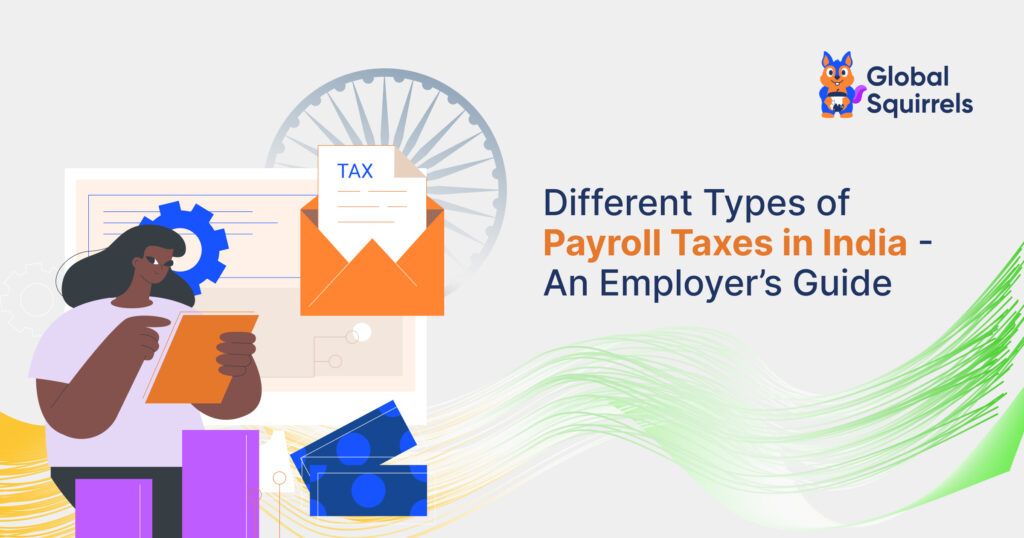Different Types of Payroll Taxes in India – An Employer’s Guide

India’s tax structure and slabs differ from Western countries like the US or the UK. The Tax Deductions at Source (TDS) concept implemented in the Indian tax system works differently, and employers understand the essential and compulsory deductions. This blog will show you the kinds of payroll taxes in India & other aspects of the Indian tax system, and how employer tax in India works.
If we look at India’s history, the first income tax act was introduced in 1860 by Sir James Wilson, the first finance minister under British rule in India. However, post-independence, the Indian government modified and revised the old tax structure and implemented a new structure based on the country’s economic situation.
In the Indian tax system, tax payment is compulsory, and the government decides the Indian payroll tax structure every year and declares it for the public during the budget session.
What are payroll taxes in India?
In the Indian payroll taxes, paying the tax as a contribution towards the country’s growth is mandatory. The tax amount is decided by the Finance Ministry, and the government sets a duration for the payment. Further, the government chooses the tax amount based on the annual Income of an individual professional.
Types of payroll taxes in India
There are several types of payroll taxes in India. Below are the types of payroll taxes:
Income tax
Income tax is prime in the Indian tax system. The Indian government majorly earns through income tax. The tax slabs are variables and depend on the individual taxpayer’s annual income.
Employees provident fund (EPF)
EPF is another significant component in the Indian payroll tax system. Every month, the EPF amount is deducted from the salary of Indian employees and deposited into the EPF account. The fund is for retirement plans or other benefits. Employers also contribute to the Employees Provident Fund.
Employment state insurance (ESI)
Employment State Insurance is a healthcare and social security scheme. The ESI scheme is eligible for a low or moderate salary package. Employers and employees contribute to this fund to support medical and other social benefits to employees and their families.
Professional tax
Professional tax is a state-level tax imposed on employees based on their earnings and job titles. The tax is deducted from employees’ salary accounts and varies across the states.
Tax deduction at source (TDS)
TDS is a source-based tax collection system. TDS is deducted by employers from employees’ salaries and deposited with the government on behalf of employees. This is called the employer tax in India.
Read related article: Employment Laws and Mandatory Benefits in India
Tax slabs for different Income – the breakups
The tax slab depends on an individual’s earnings annually. The Indian payroll calculation is decided by the percentage that the government has decided. There are different slabs for different packages. Here are the breakups:
New tax bracket:
- Up to Rs 2,50,000( $2,412) – No tax
- Rs 2,50,000 to Rs 5,00,000( $3,015 – $6,031): 5%
- Rs 5,00,000 to Rs 7,50,000 ( $6,031 – $9,048): 10%
- Rs 7,50,000 to Rs 10,00,000 ($90,482 – $12,064): 15%
- Rs 10,00,000 to Rs 12,50,000($90,482 – $15,081): 20%
- Rs 12,50,000 to Rs 15,00,000 ($15,081 – $18,097): 25%
- Above Rs 15,00,000 ($18,097): 30%
How is payroll tax calculated?
The Indian payroll tax calculation is based on the employee’s annual earnings. Payroll tax, EPF, ESI, and other schemes have dynamic calculation methods that change based on the earning status. Let’s see how the payroll is calculated:
Income tax calculations
- Income is calculated based on annual earnings, bonuses, allowances, and other perks
- The taxable amount is divided into different tax slabs
Employees provident fund calculations
- In the EPF account, both employers and employees contribute a fixed amount, it is called the employer tax in India.
- Currently, 12% of the employee’s basic salary plus dearness allowances are deducted and deposited to EPF account
ESI contribution calculations
- ESI calculation is based on the employee’s gross salary, which would be a maximum limit
- The current rate of ESI is 0.75% of an employee’s gross salary. Employers contribution is 3.25%
Professional tax calculations
- The professional tax depends on an individual employee’s annual earning
- The taxable amount is vary and depends on the state where the employee works
Tax deduction at source ( TDS)
- TDS is deducted based on the employee’s annual earnings as per the Indian payroll calculation
- Employers deduct the TDS from employees’ salaries and deposit it into the government.
Why is paying payroll taxes in India important?
There are several ins and outs if you miss the last date for the income tax deposit. However, it is not acceptable that employers and employees are not ready to pay the income tax. Following are the measures you can face if you do not deposit the taxable amount to the government in India:
Compliance with law
Employer tax in India works in a way where the employer must deduct the taxable amount from their salaries and deposit it into the government. Non-compliance can lead to hefty penalties, fines, and other legal issues, as per Indian labor laws.
Employee benefits
Taxable amounts like EPF and ESI ensure social security and support the medical expenses of employees. The amount is further helpful at retirement, even beneficial for their family members.
Revenue generate
The taxable amount is deposited into the government account. As per the Indian payroll tax structure, the government further utilizes the funds for infrastructure, communication, education, healthcare, and other schemes that benefit society.
Employee rights protection
Payroll tax helps employees in their needy hours. EPF and ESI-like schemes provide monetary support for retirement, emergency healthcare, or kids’ educational and marriage purposes. In this way, the taxable amount benefits employees’ family members.
The calculation of taxes and other benefits is time-consuming. Even small mistakes in calculations can bring fines and penalties. Legal consequences can lead to further complexities for employers. Therefore, you can rely on an expert to avoid such hurdles – Global Squirrels.
How does Global Squirrels help you in calculating the payroll tax in India?
Global Squirrels is one of the leading Employer of Record service providers that calculate the compensation, benefits, and taxes accurately and quickly. With payroll, the platform further helps find the right talent for your organization.
The SaaS platform provides end-to-end solutions in the hiring and payroll process. The charges start at $1.49/ hour/ employee.
For more information, consult with our expert today!
Conclusion
Paying payroll taxes is mandatory in India. There are different income tax brackets as per the Indian Income Tax Department. Employers must understand the payroll taxes, employer tax in India, calculation methods, and the consequences if they miss paying the taxable amount in time. Further, if you want to make your hiring journey in India seamless and have accurate Indian payroll calculations and taxes, the Global Squirrels platform will support you in every phase.
